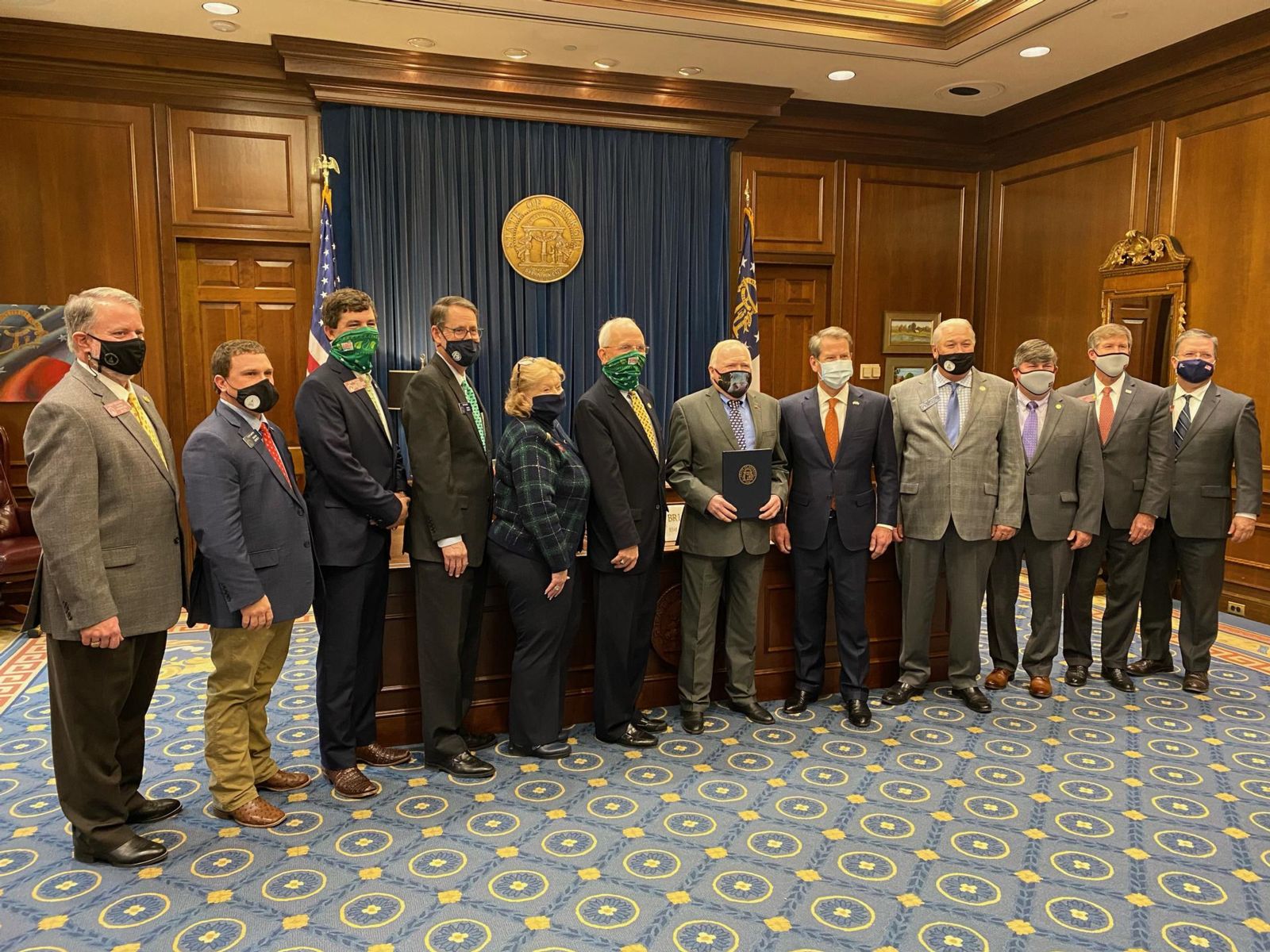Legislative Session Report Week 4
February 5, 2021
GENERAL ASSEMBLY MEETS FOR FOUR DAYS, SET TO RETURN MONDAY
The General Assembly met for four days this week leaving us at legislative day 12, with lawmakers set to return to the state capitol on Monday for day 13. Momentum has continued to pick up as legislation is still being taken up by both chambers and committees are now in full swing for what is the first of the new two-year session. The House Agriculture and Consumer Affairs Committee held its first meeting this week led by its new Chairman, Representative Robert Dickey (R-Musella). On Thursday, the full Senate Appropriations Committee passed the amended FY21 budget out of committee and it is now on its way to the Senate floor for a vote.
As work under the Gold Dome continues, Georgia Farm Bureau staff will be monitoring the issues affecting our members and Georgia’s number one industry. Please see below for the Bills of Interest section which lists introduced legislation affecting Georgia agriculture.

Speaker of the House David Ralston (R-Blue Ridge) presides over the House.
GEORGIA FARM BUREAU HOSTS RURAL CAUCUS; PRESIDENT TOM MCCALL SPEAKS
Georgia Farm Bureau (GFB) President and former State Representative Tom McCall returned to his old stomping grounds this week as GFB hosted this week's Rural Caucus meeting. The Rural Caucus is made up of the legislature’s strongest advocates for rural Georgia and represents the interest of communities where agriculture is the predominant way of life.
President McCall welcomed the freshmen legislators to the group and thanked his former colleagues for their continued service to the state of Georgia. He encouraged those who are not already members of GFB to join, and introduced them to GFB's Public Policy team, most of whom they have the opportunity to see frequenting the halls of the Capitol each week. We are grateful for the legislators who take the time out of their busy schedules and return each week to learn more about Georgia's rural communities, industries, and organizations.

GFB President Tom McCall speaks to the Rural Caucus
AFY21 BUDGET ADVANCES; SENATE AMENDS
The Senate Appropriations Committee, along with its subcommittees, continued their hearings and work evaluating the House version of the Amended Fiscal Year 2021 (AFY21) Budget this week. The Committee passed their version of the AFY21 Budget on Thursday, which will go before the full Senate next week. As you recall, last year, extensive cuts were made which started as fiscally conservative measures but were ultimately necessities to reflect projected revenue losses resulting from the COVID-19 shutdowns. Fortunately, the state’s economy weathered the past year better than expected, and the legislature is able to add money for the final six months of the fiscal year.
Throughout this budget process there has been more cooperation between the Governor, House, and Senate than ever before. Many of the additions focus on strengthening Georgia’s public health response capabilities to COVID-19, supplementing the needs of our education system, and assisting those devastated by the shutdown, such as the Georgia National Fairgrounds.
GOVERNOR KEMP HONORS GERALD LONG
Former Georgia Farm Bureau President Gerald Long traveled to Atlanta on Thursday at the invitation of Governor Kemp, who presented him with a commendation for his career-long service to agriculture.
Numerous legislator friends attended the ceremony honoring Mr. Long, thanking him for his years of leadership. Long graciously accepted the honor and reminded them of the duty they carry to protect the future of agriculture.

Former GFB President Gerald Long, surrounded by legislators, accepts a commendation from Governor Brian Kemp on Thursday.
REP. DICKEY CHAIRS FIRST HOUSE AG MEETING
The House Agriculture and Consumer Affairs Committee met on Wednesday, the first meeting held under the leadership of Chairman Robert Dickey (R-Musella). With limited in-person attendance due to health and safety restrictions, some members joined via Zoom. As the legislative session progresses, committee meetings will be broadcast virtually. If you would like to watch the committee meetings live, click here. To view a recording of past meetings, click here.

House Agriculture and Consumer Affairs Chairman Robert Dickey (R-Musella) chaired the first House Ag Committee meeting of the session earlier this week.
ACTION THIS WEEK
HB 282:
Reps. Meeks, England, Hatchett, Watson, Dickey
This bill provides clarity to the ad valorem taxation of qualified timberland property by defining parameters for “contiguous” property, specifying how the appraised value of timberland property is calculated, and clarifies the required documentation landowners must submit to the Commissioner of Revenue for certification.
Assigned to House Ways and Means Committee on 2/4/2021.
SB 65:
Sens. Gooch, Miller, Cowsert, Tillery, Harper, and Hatchett
In a continued effort to expand broadband access to rural and un-served communities, this legislation allows the Public Service Commission and Department of Community Affairs to utilize a portion of the Universal Access Fund for such services.
Assigned to Senate Regulated Industries and Utilities Committee on 2/2/2021.
BILLS OF INTEREST
HB 44:
Reps. Cantrell, Greene, Barr, Werkheiser, Gambill, Williams
This bill would require Georgia to observe Daylight Savings Time year round.
House State Planning and Community Affairs Committee favorably reported on 1/29/2021.
HB 90:
Reps. Williamson, Burns, Dickey, Hatchett, Morris, Watson
HB 90 seeks to address an issue that the existing 1939 statute does not appropriately cover modern forestry practices with in regards to mill purchases of cut timber and the chain of liability that follows such transactions. The legislation is supported by both the Georgia Bankers Association and the Georgia Forestry Association.
Assigned to House Judiciary Committee on 1/26/2021.
HB 139:
Reps. Mainor, Dukes, McClain, Mallow, Thomas
This bill would prohibit trains from blocking any traffic crossing for longer than 15 minutes (with exceptions for safety reasons), and also require signage at crossings providing a telephone number to report such instances.
Assigned to House Transportation Committee on 1/28/2021.
HB 150:
Reps. Williamson, Hatchett, Kelley, Frazier, Parsons, Smith
In a concerning trend, some state and local authorities in the U.S. have adopted measures banning the connection of certain fuels (propane and natural gas) in new construction in an effort to reach their “carbon free” goals. HB 150 would prohibit government entities in Georgia from banning the connection of any utility service based on the type or source of fuel. GFB supports this bill, as many agricultural producers rely on these resources.
Assigned to House Energy, Utilities, and Telecommunications Committee on 1/28/2021.
SB 29:
Sen. Anavitarte
This bill would require those wishing to vote in a Georgia election by absentee ballot to include a photocopy of their driver's license, voter ID card, U.S. passport, government employee ID, military ID card, or tribal identification card both when applying for an absentee ballot application and when returning it. Members of the military and overseas voters would be exempt from this requirement.
Assigned to House Ethics Committee on 1/28/2021.
SB 30:
Sens. Beach, Harbison
Senate Bill 30 would provide for pari-mutuel horse racing in the state at a limited number of licensed equestrian centers, create the Georgia Horse Racing Commission, and provide for the comprehensive regulation of pari-mutuel horse racing and related activities.
Assigned to House Regulated Industries and Utilities Committee on 1/28/2021.
2021 GEORGIA FARM BUREAU DAY AT THE CAPITOL CANCELED
Due to a rise in COVID-19 cases and other uncertainties in the state's capital, Georgia Farm Bureau has made the executive decision to cancel the annual Farm Bureau Day at the Capitol event, originally scheduled for February 9, 2021 in Atlanta. Please mark your calendars for next year's event, expected to take place on February 8, 2022.
GEORGIA AG FORECAST: 2021 OFFERS OPPORTUNITY FOR 'RURAL TO SHINE'
Josh Paine, University of Georgia College of Agricultural and Environmental Sciences
The pandemic has put a strain on all sectors of the economy, and the agricultural and food industries were no exception. From supply chain disruptions that led to dumping milk and crops to increased consumer demand for plants, there were many ups and downs in 2020 markets.
University of Georgia agricultural economists recapped the unique year and prognostications for 2021 through the Georgia Ag Forecast seminar presented via webinar Jan. 29 and the annual report available online.
Dual studies track agritourism, COVID-19 effects on producers
Since 2014, the agritourism farm gate value has grown more than 40% in Georgia, and a recent survey conducted by College of Agricultural and Environmental Sciences faculty shows that about 6 out of 10 motivated travelers seek rural or small towns when selecting a destination for a leisure trip.
“I don’t see a better time ever, in my personal history, where rural and agritourism has the chance to showcase itself,” said John Salazar, associate professor and coordinator of the college’s Hospitality and Food Industry Management Program. “Rural communities have to be more marketing savvy, and agribusinesses have to collaborate with their local destination marketers. There’s no better scenario than for rural to shine.”
Agritourism activities may include festivals, farm tours, U-pick operations, horseback riding, farmers markets, farm vacations, wineries, picnic areas, biking and hiking trails, and special events including weddings and related educational programs.
“The urban markets have taken a big hit. People want to travel, and there’s still a portion of people that have money to travel, but they don’t want to go to places where they don’t feel safe. These activities really do align themselves well with social distancing.”
Greater spring and summer travel is anticipated compared to 2020; April and May were the two top months of planned travel in Georgia for survey respondents, with June and July following.
“There’s an association between rural and agritourism activities. People are looking for agritourism and that small-town experience,” Salazar said. “The hospitality opportunity in these rural communities has an elevated platform that it never had before. There was almost twice the hotel occupancy decline in the urban market compared to rural.”
Agritourism could be a solution to mitigate low prices and the lack of market opportunity for some producers. About three-quarters of farmers surveyed by CAES agricultural economists say that they have financial concerns. Polls were conducted in May and December 2020 to gauge a number of factors including revenue, financial assistance and health.
“The situation is so evolving we wanted to look back through the retrospective survey on the year,” said Sharon Kane, senior public service associate for the UGA Center for Agribusiness and Economic Development. “This is an ongoing, dynamic situation, and these are glimpses into what’s been going on.”
On average, farmers surveyed who applied for financial assistance expect that about 20% of losses have been or will be covered by relief programs. The Payroll Protection Plan (PPP) was the top relief program reported in both surveys. A number of respondents said that they were not participating in any program.
Of all commodities, livestock was the most affected in the spring and year-end surveys. The top issues across all commodities were low prices and lack of markets in both surveys. As the year went on, more respondents were concerned about the health and emotional impacts of the pandemic.
Commodity outlooks
Poultry, peanuts and the green industry were up in 2020. Recovery for other sectors depends on multiple factors, including the pandemic, trade and weather. The following is an overview of the 2021 Georgia Ag Forecast report authored by Department of Agricultural and Applied Economics faculty.
Poultry, livestock and dairy
Despite production disruptions, 2020 broiler production is expected to be 2% greater than 2019 and aggregate prices rose about 10%, according to Todd E. Southerland, senior vice president for food and agribusiness at Truist Bank, and prices could remain higher this year.
“Consumers should expect an inflationary price environment for food over the coming years. The ‘long tail’ analysis of COVID-19 includes the likelihood of lasting impacts on the food industry, such as enhanced food-safety protocols and employee safeguards, all of which come at a price,” Southerland reports.
Beef cattle prices are expected to rise as production trends down and liquidation continues. Demand is expected to increase as the economy recovers. Pork production will likely have slow growth this year, but feed prices could impact profit for producers even though export demand is expected to remain strong in the short term. Milk production is expected to expand, but low milk prices and higher feed costs will hamper profit margins.
Row crops
Cotton acreage and production in Georgia were lower in 2020, from 1.4 million planted acres in 2019 to 1.2 million. As discretionary items, cotton products follow global economic trends and recovery will depend on multiple factors.
Partly due to lower cotton prices and higher yields, 2020 was a notable year for peanuts with a fourth-highest record 1.64 million tons for Georgia. Consumer sales of peanut butter, peanuts in candy and snack peanuts were up, and this trend is expected to continue this year. Global demand for corn, wheat and soybeans will remain strong in 2021.
Fruits, vegetables and tree nuts
Reduced exports and consumer reactions to COVID-19 were blamed for 2020’s decreased consumer price index for fresh fruits. Pecan production is expected to be higher this year after two decreased years from the impact of Hurricane Michael. Blueberry imports have increased eightfold from 2005 to 2018, causing serious economic injury to domestic growers in recent years. An opportunity for blueberry exporters lies with new trade with China, which was allowed last year. Vegetable prices are expected to be strong in 2021. The total harvested area was down 7.7% in 2019 compared to the year before and is expected to be lower in 2021.
Horticultural industry
With housing starts and consumers stuck at home, 2020 was a bumper year for the green industry — businesses associated with ornamental plants; landscape and garden supplies; and nursery, greenhouse and sod growers — but the coming year is expected to be comparable to 2019 levels. Plant sales were up about 2% last year, with more consumers purchasing online than before.
Forestry
Pulpwood was adversely affected by the pandemic with reduced demand for printing and writing papers, down about 13% across the South. Conversely, softwood lumber has increased across the area over the last decade and is expected to hit 25 billion board feet in 2021. The Forestry report was provided by Forisk Consulting and UGA's Warnell School of Forestry and Natural Resources.
To view the recordings and the complete 2021 Georgia Ag Forecast report, visit agforecast.caes.uga.edu. The seminar is sponsored by Farm Credit Associations of Georgia, Georgia Farm Bureau, Georgia Agribusiness Council, Georgia Department of Agriculture and Georgia Grown.
UGA UPDATES AG PROPERTY TAX PROGRAM RESOURCE
The University of Georgia’s Harley Langdale Jr. Center for Forest Business released an updated version of their Property Tax Incentives for the Georgia Landowner last June. This educational guide provides an easy-to-understand breakdown of various ad valorem tax programs most producers enroll in. To download a copy of this resource, click here.
SOUTH AFRICA FARM LABOR EXEMPT FROM TRAVEL BAN
The U.S. State Department clarified its ban on noncitizens entering the United States from South Africa. A Biden administration proclamation suspended travel from several countries due to COVID-19 concerns. The State Department clarified that agriculture workers entering the U.S. qualify for national interest exceptions on a case-by-case basis.
The American Farm Bureau Federation sent a letter to Secretary of State Antony Blinken and Acting Homeland Security Secretary David Pekoske last week requesting an exemption for South African farm labor.
“We appreciate the swift action by the State Department to address a critical need for American agriculture,” said AFBF President Zippy Duvall. “Farm workers from South Africa bring valuable and unique skills to the farms on which they are employed. America’s farmers rely on the H-2A program to provide a robust workforce and we are committed to ensuring their safety while continuing to provide healthy, affordable food for families across the country.”
President Biden’s proclamation allows for noncitizens to be exempt from the ban if their arrival is in the national interest. Food and agriculture workers have been deemed essential during the pandemic.
NOT A MEMBER OF GEORGIA FARM BUREAU? JOIN TODAY!
The Georgia Farm Bureau Federation has a membership of almost 250,000 and serves as state's the largest general farm organization. Our goal is to provide leadership and assistance to the agricultural sector, to promote farm products, to aid in ag-related procurement, to be a spokesman for the farmer in the legislative arena, to be a leader in the development and expansion of farm markets, and to strive for more agricultural research and educational funds and facilities.
With members in all 159 Georgia counties, Georgia Farm Bureau is dedicated to promoting and improving agriculture in our counties, state and nation and in continually improving and expanding our service-to-member programs which serve to enhance the quality of life for all Georgians.
Membership in Georgia Farm Bureau is open to everyone. You don't need to be a farmer or have insurance with us to join Farm Bureau!
If you would like to become a member of Georgia Farm Bureau, you can start your membership online right now! We have a simple application process, and you can be our newest member in just a couple of minutes. Click the button below or use our County Office Locator to find the office nearest you.
Georgia Farm Bureau Public Policy Department Staff
Jeffrey Harvey, Director
Joe McManus, Assistant Director
Alex Bradford, State Affairs Coordinator
Raynor Churchwell, Agricultural Programs Specialist
Tripp Cofield, National Policy Counsel
Katie Duvall, Advocacy and Policy Development Coordinator
Renee Jones, Office Coordinator
Jake Matthews, Governmental Affairs Specialist
Jeremy Taylor, Agricultural Programs Specialist
** Photos courtesy of Georgia House and Senate photography gallery.

